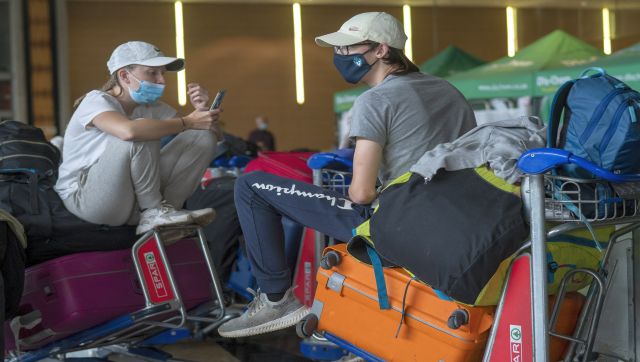Travel restrictions on nations in southern Africa – where Omicron was first identified – by dozens of countries, including the United States and Britain are being called “travel apartheid”. This, even as little is understood about the latest variant regarding transmissibility and its ability to evade immunity and with Africa continuing to have some of the lowest COVID-19 vaccination rates worldwide due to a lack of access to doses. But who coined the term travel apartheid? What have world leaders said? And what do the experts say about such restrictions? Let’s take examine this briefly: Who coined the term? The term ‘travel apartheid’ was first used by United Nations Secretary-General Antonio Guterres, who said travel restrictions imposed over COVID-19 that isolate any one country or region as “not only deeply unfair and punitive – they are ineffective.” Speaking to reporters in New York, Guterres said the only way to reduce the risk of transmission while allowing for travel and economic engagement was to repeatedly test travellers, “together with other appropriate and truly effective measures.” “We have the instruments to have safe travel. Let’s use those instruments to avoid this kind of, allow me to say, travel apartheid, which I think is unacceptable,” Guterres said. Guterres has long warned about the dangers of vaccine inequality around the world and that low immunisation rates are “a breeding ground for variants.” Which leaders have criticised travel restrictions? Nigeria on Monday slammed the UK’s travel restrictions after it was placed on the red list amid fears over the Omicron COVID-19 variant. “What is expected is a global approach, not selective,” Sarafa Tunji Isola, Nigeria’s high commissioner to the UK, told the BBC. “The travel ban is apartheid in the sense that we are not dealing with an endemic,” Isola said. “We are dealing with a pandemic. Whenever we have a challenge there must be collaboration.” “These travel bans are not justified,” said African Union Commission Chair Moussa Faki Mahamat at the joint news conference with Guterres after the annual meeting between the United Nations and the African Union. Last week, South African president Cypril Ramaphosa, speaking at the Dakar International Forum for Peace and Security, said the restrictions are punishing the very people and governments that helped inform the world of a new coronavirus variant. “When South African scientists discovered Omicron … they immediately took on the responsibility of informing the world, the entire world, that a new variant is coming through. And what is the result?” Ramaphosa asked, replying that is was punishment. Ramaphosa further denounced the bans as “hypocritical, harsh and not supported by science.” “We say those bans must be removed with immediate effect,” he declared. Senegalese president Macky Sall, at the same event, emphasized the importance of international solidarity in this time of uncertainty. “The emergence of a new variant in several countries is a reminder that we are all exposed… and in a state that commits us to be resilient, determined and combative as necessary in the face of the harmful effects of a double health and economic crisis,” he said, noting that Africa is also “particularly vulnerable to climate change, the intensification of terrorist attacks and the resurgence of coups d’état. The emergency is here.” Sall said no individual government or nation or continent can ensure collective security, only international solidarity. “Environmental and health sectors, organized crime, piracy, cybercrime, migration, and all other cross-border challenges, no country will be able to face solely,” Sall said. “This means that peace and security in Africa are an integral part of peace and security in the world.” Malawai president Lazarus Chakwera wrote on Facebook: “COVID measures must be based on science, not Afrophobia.” What experts say As per The Guardian, Maria Van Kerkhove, the WHO’s technical lead on COVID-19, said travel bans had limited the ability of South African researchers to ship virus samples out of the country. “We do not want to see countries penalised for sharing information, because this is how WHO and our partners make assessments and how we provide advice,” she said. Dr Saumitra Das, director of the National Institute of Biomedical Genomics, told India Today the Indian government must take policy decisions to restrict the spread of Omicron variant, but closing borders is not a solution. Shabir A Madhi, vaccinology professor at University of the Witwatersrand in South Africa, told the outlet imposing travel bans is a ‘naïve’ solution. ‘Unfortunate language’ Speaking to the BBC, UK government minister Kit Malthouse, said the wording “travel apartheid” was “very unfortunate language”. “We understand the difficulties that’s created by these travel restrictions, but we’re trying to buy a little bit of time so that our scientists can work on the virus and assess how difficult it’s going to be” he told the BBC. With inputs from agencies Read all the Latest News , Trending News , Cricket News , Bollywood News , India News and Entertainment News here. Follow us on Facebook, Twitter and Instagram.
Last week, South African president Cypril Ramaphosa said the curbs are punishing the very people and governments that helped inform the world of a new coronavirus variant
Advertisement
End of Article


)

)
)
)
)
)
)
)
)



